wa [wà] pron. a form of the 2nd pers.
pl. pron.: you.: Wa ghẹ gui ― “You
(pl.) don’t be angry: Don’t be angry.”

waa1 [wàá] vb. 1. to lay out; to
display; to spread out: Ọ waa emwin
ne ọ khiẹn ye atẹtẹ ― “She displayed
what she was selling on a straw tray.”;
%%

2. to divide into parts or groups: Ọ
waa iran ye ihi-eha ― “She divided
them into three parts.”

waa2 [wàá] vb. to castrate (e.g. goat
or dog).

waa3 [wàá] vb. (in wabọ) “to ex-
$Page 161$

terminate” (the branches or offspring):
A wabọ ọre ― “His lineage has been
exterminated.” A gha wabuaa (a
common curse) “May your lineage
be exterminated.”
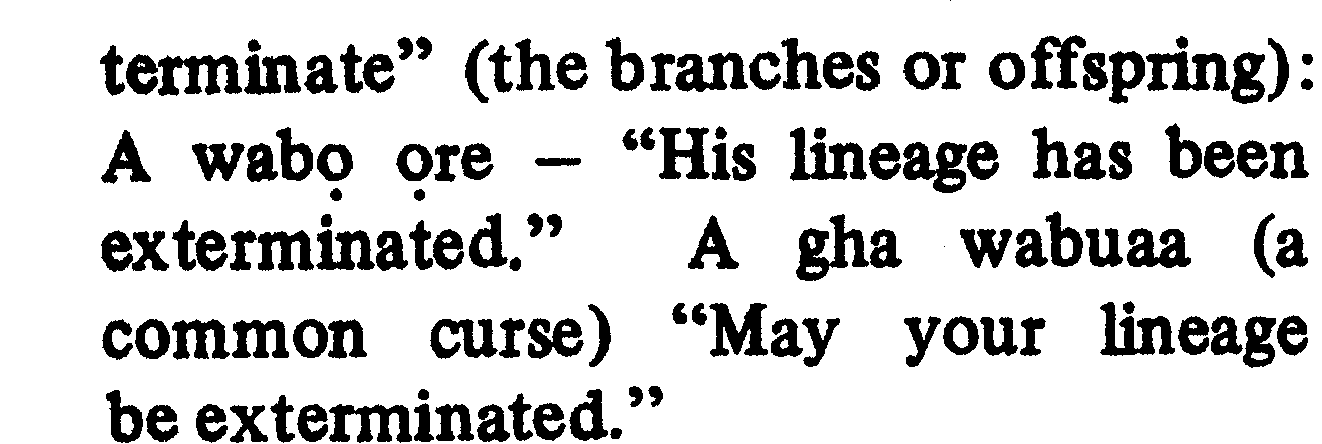
waan1 [wã̀ã́] vb. 1. to grow up; to
mature: Ọ ma he waan ― “She is
not yet matured.”

waan2 [wã̀ã́] vb. to be wise; to be
intelligent: Ọvbokhan na waan gbe ―
“This child is very intelligent.”

waan3 [wã̀ã́] vb. (of the day) to dawn;
to grow light: Ẹdẹ waan nẹ ― “The
day has dawned.”

wagha [wàɣá] vb. to disintegrate; to
crumble: Ukpudu umwẹn ne ọ mu
mwẹn wagha ye ọre obọ ― “The
lump of salt that she was holding
has crumbled in her hands.”
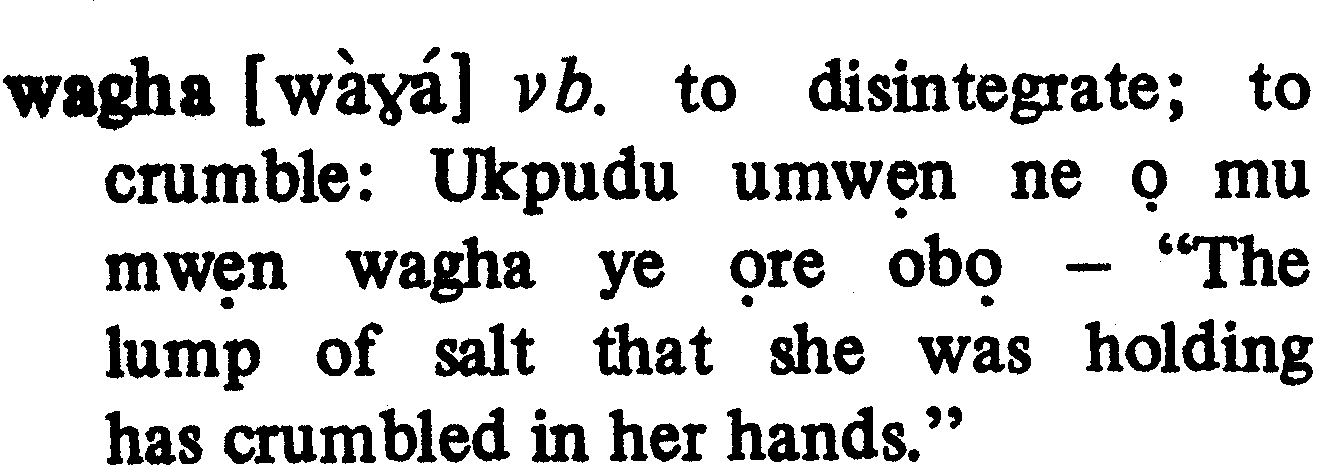
waghawagha [wàɣàwàɣà] adj. crumbly.

wanmẹ [w̃ã́mɛ̃̀] vb. (< wọn ― amẹ)
to drink water.

wannawanna [w̃ã̀nã̀wã̀nã̀] adj.; adv.
describes anything with a sheen;
flashy: Ọ fi wannawanna ― “It is
shining brightly”. Ọ ye wannawanna ―
“It is flashy”.

wanniẹ [w̃ã̀nỹɛ̃́] vb. 1. to respond; to
reply.; 2. to argue with: Ohan i gi
a wanniẹ ọnrẹn ẹmwẹn ― “One does
not argue with him for fear.”

wannọ [w̃ã̀nɔ̃́] vb. to isolate; to se-
parate: Ọ wannọ iran ― “He separated
them.”

wanwan [w̃ã́w̃ã̀] adv. right now (cf.
wanwanna).

wanwanna [w̃ã́w̃ã́nã́] adv. just now;
right now: Wanwanna ọ kpaọ ― “He
%%

left only just now.” (also wanwan).

wanwanwan [w̃ã̀w̃ã̀w̃ã̀] adj.; adv. cf.
wannawanna.

we [wé] vb. to order (something); to
send for something from the market:
Ọ we mwẹn izẹ ― “She ordered for
rice through me.”

wee1 [wèé] vb. 1. to open by lifting
the lid; to uncover: Ọ wee ọkpan
ne ọ ghe emwin ne ọ rọọ ― “He
opened the dish to see what is in it.”;
2. (of hat) to lift off (from the head);
3. (of book) to open.
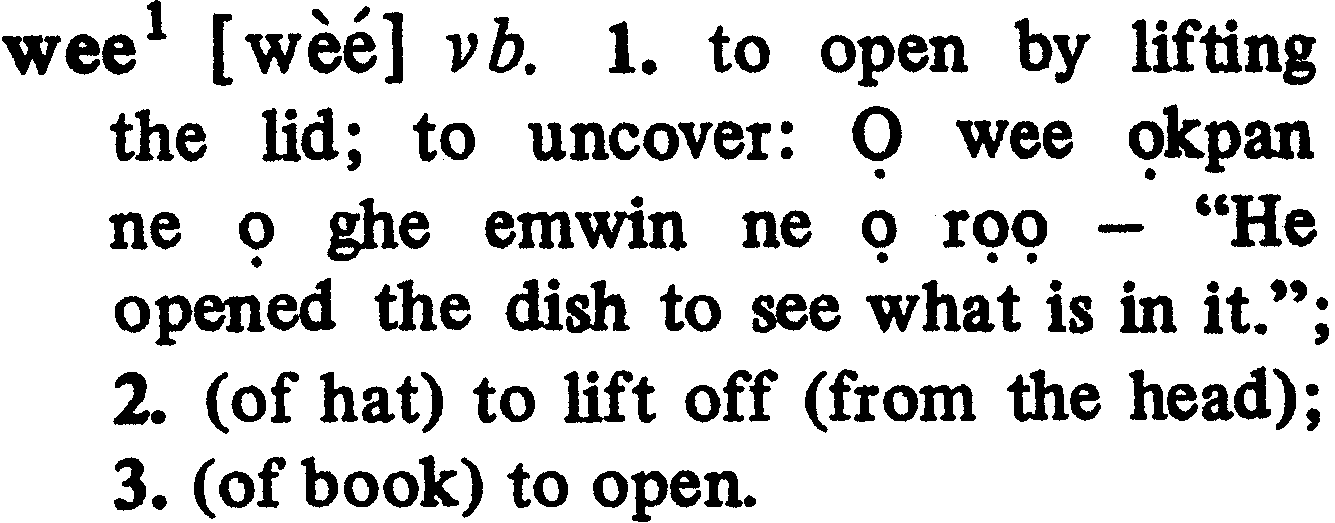
wee2 [wèé] vb. 1. (of a crowd) to
shout in applause; to shout in unison.;
2. to shout upon in contempt (e.g.
a thief or criminal); to boo at: Iran
gha wee oyi nii khian ― “They are
booing the thief along.”
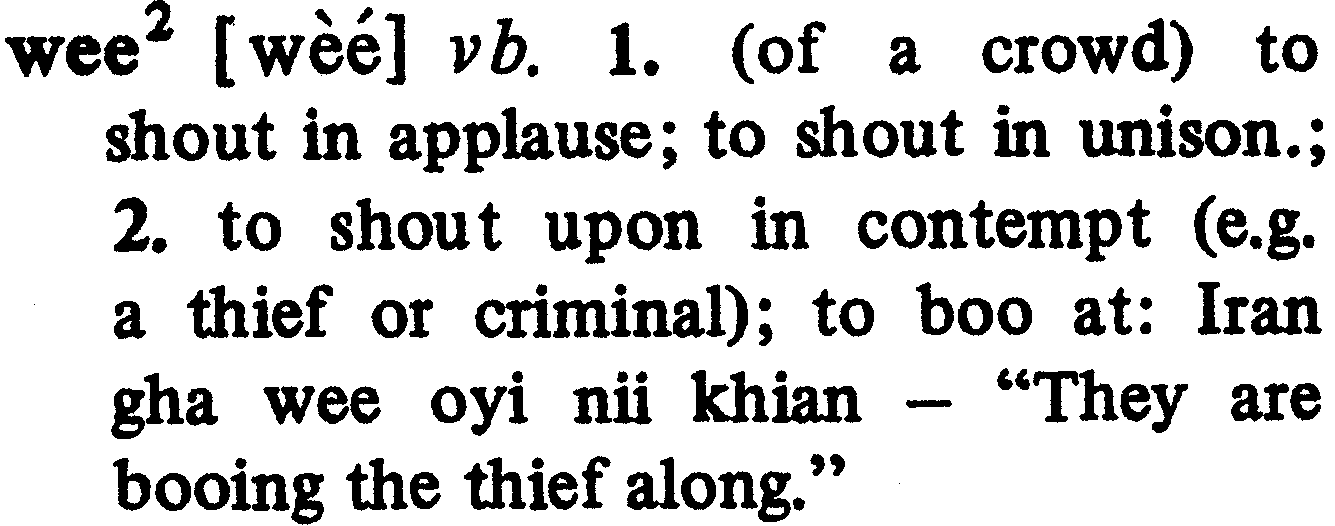
wegbe [wègbé] vb. to be strong; to
be energetic.

werriegbe [wèriègbé] vb. to turn back;
to go back; to return: Ọ werriegbe
gha rrie ẹvbo ẹre ― “He went back
to his country”; (with another verb
in a serial construction, it usually
has the adverbial meaning of “again”).
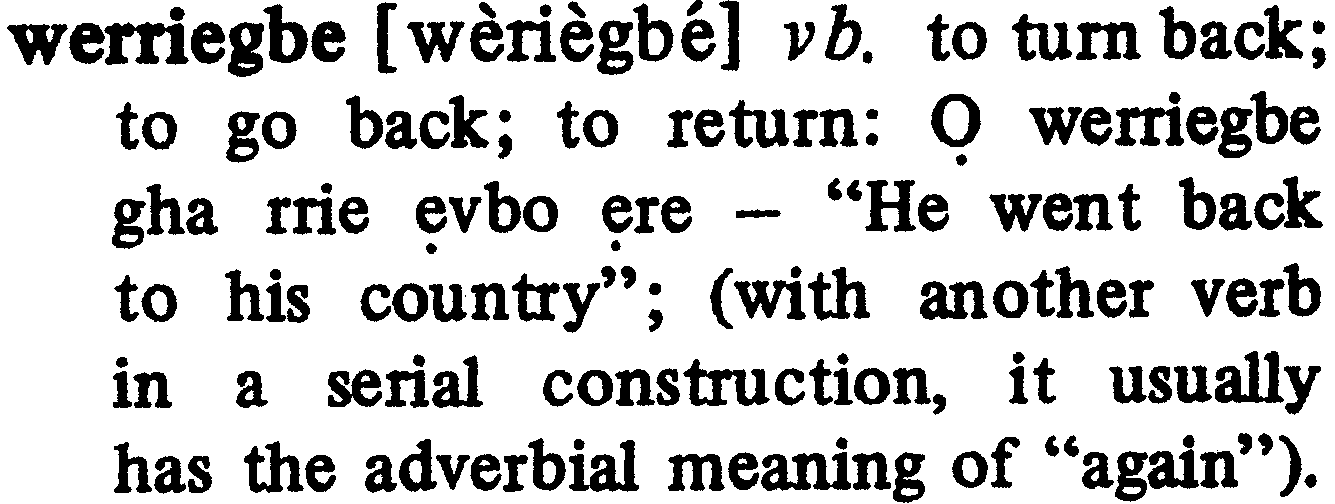
werriẹ [wèriɛ́] vb. to roll; to turn over:
Ọ werriẹ fi uvun ― “He rolled into
a hole.”

wẹẹ [wɛ́ɛ̀] vb. to say (usually doesn’t
require a complementizer): ọ wẹẹ ọ
foo nẹ ― “He said (that) it is finished.”

wẹiwẹi [wɛ́iwɛ́i] adv.; adj. 1. (of a
walk): briskly; with agility; 2. de-
scribes tiny or under-sized objects.

wẹnrẹn [w̃ɛ̃̀ɽ̃ɛ̃́] vb. thin, narrow, lean.

wẹro [wɛ́ɽò] vb. to be resourceful;
$Page 162$

sensible.

wẹwẹ [wɛ̀wɛ́] vb. to drizzle.

wẹwẹrhẹ [wɛ́wɛ́řɛ́] adj. wide and
shallow.

wẹwẹwẹ [wɛ́wɛ́wɛ́] adj. (of speech or
talk) whispered; ọta-wẹwẹwẹ ―
“gossip.”

wia [wìá] vb. to smell: ehe hia wia ―
“Everywhere is smelling.”

wie [wìé] vb. to collapse; to fall in a
heap: Ekẹn wie rhu iran ― “The
wall collapsed on them.”

wiẹn [w̃ỹɛ̃́] vb. 1. to wear out some-
thing (to use roughly); 2. to be worn
(e.g. from friction, or from being
rubbed against something else); 3.
to be rumpled: Ukpọn mwẹn hia
wiẹnrẹn vbe ẹkpẹtin ― “All my clothes
are rumpled in the box.”
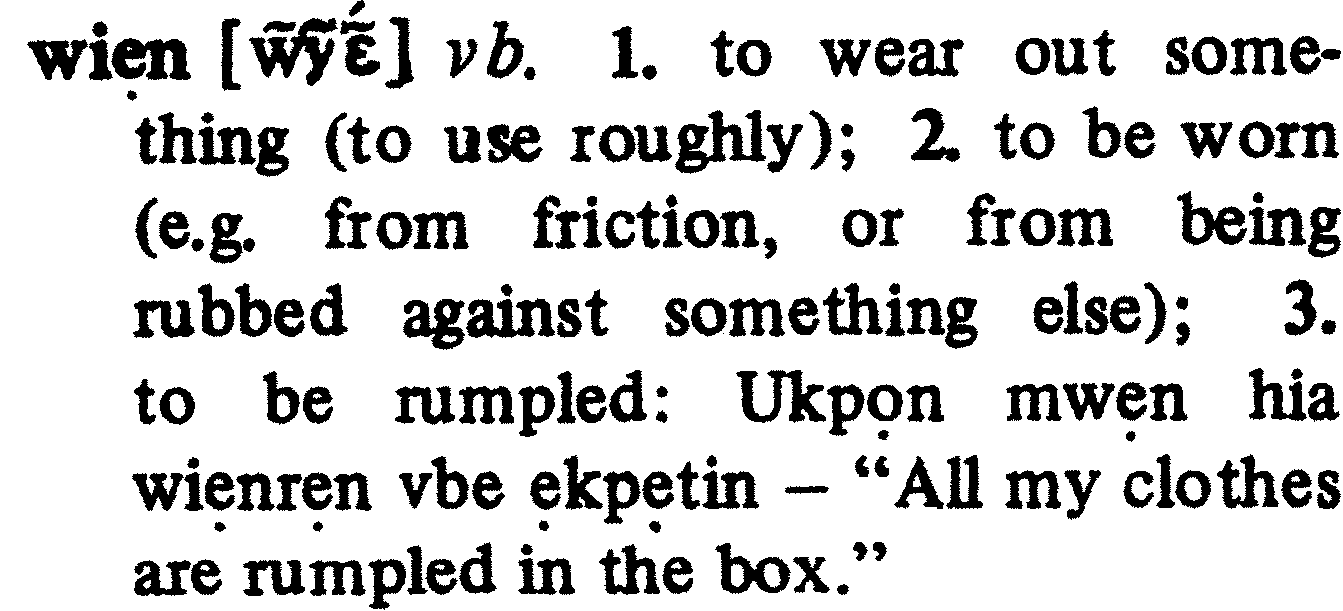
wii [wìí] vb. to get lost; to be missing:
Igho mwẹn wiiri ― “My money is
missing.”

wika [wíkà] vb. 1. to struggle along;
to make a great effort: Ọ wika lele
iran ― “He struggled to keep up
with them.”; 2. to be hardened; to
be tough: Ọ wika gbe ― “He is very
tough.”
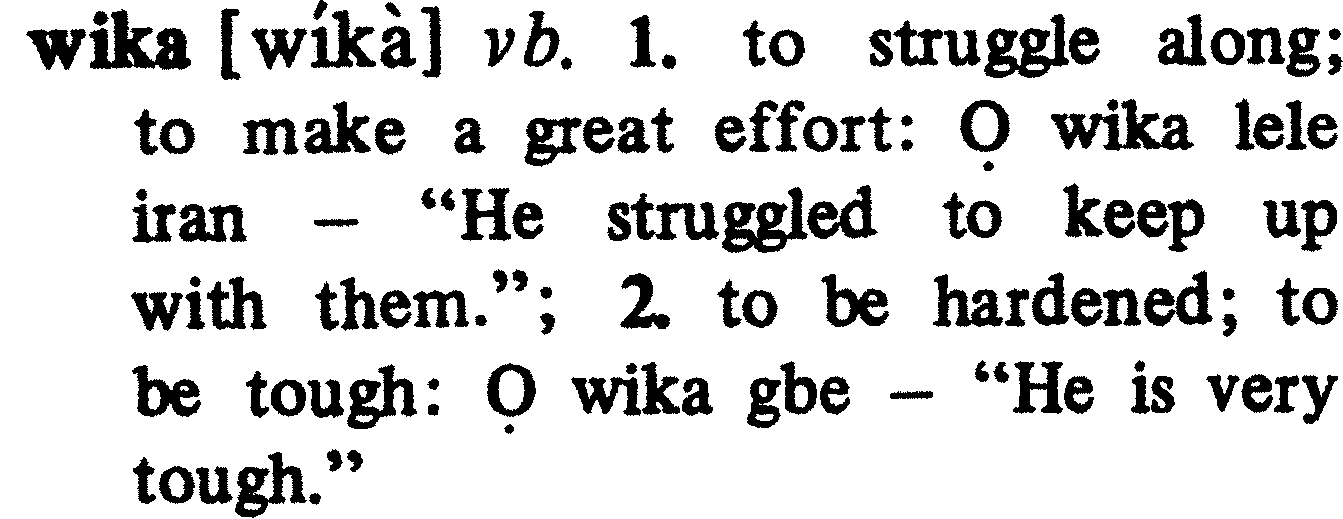
winhin [w̃ĩ̀hĩ́] vb. to scent; to give off
a pleasant smell (e.g. of food). Uwọn-
mwẹn ne ọ le wa winhin sẹ ediran ―
“The soup she is cooking has scented
this far.”

winna [w̃ĩ̀nã́] vb. to work; to labour:
Ọ winna gbe ― “He works very hard.”

wio [wìó] vb. 1. to slip out (e.g. of
beads on a string); to drop from
a string: Emiegbe mwẹn wioro ― “My
%%

beads have dropped from the string.”
(also used of things tied together.)

wiolo [wyòló] vb. pl. or iter. sense of
wio: Owẹe hia wioloo kua vbe irri
― “All the broomsticks have slipped
off from the rope.”

wo [wó] vb. 1. to be strong; to be
tough: Erhan na ma wo ― “This wood
is not strong”; 2. to be difficult;
to be hard: Iwinna na ghá wo ― “This
work will be hard.”; 3. (of certain
fruit, e.g. plantain, coconut) to be
mature; to be ready to pick: Ọghẹdẹ
na ghá kpẹe ọ ke wo ― “This plantain
will take a while to become mature.”
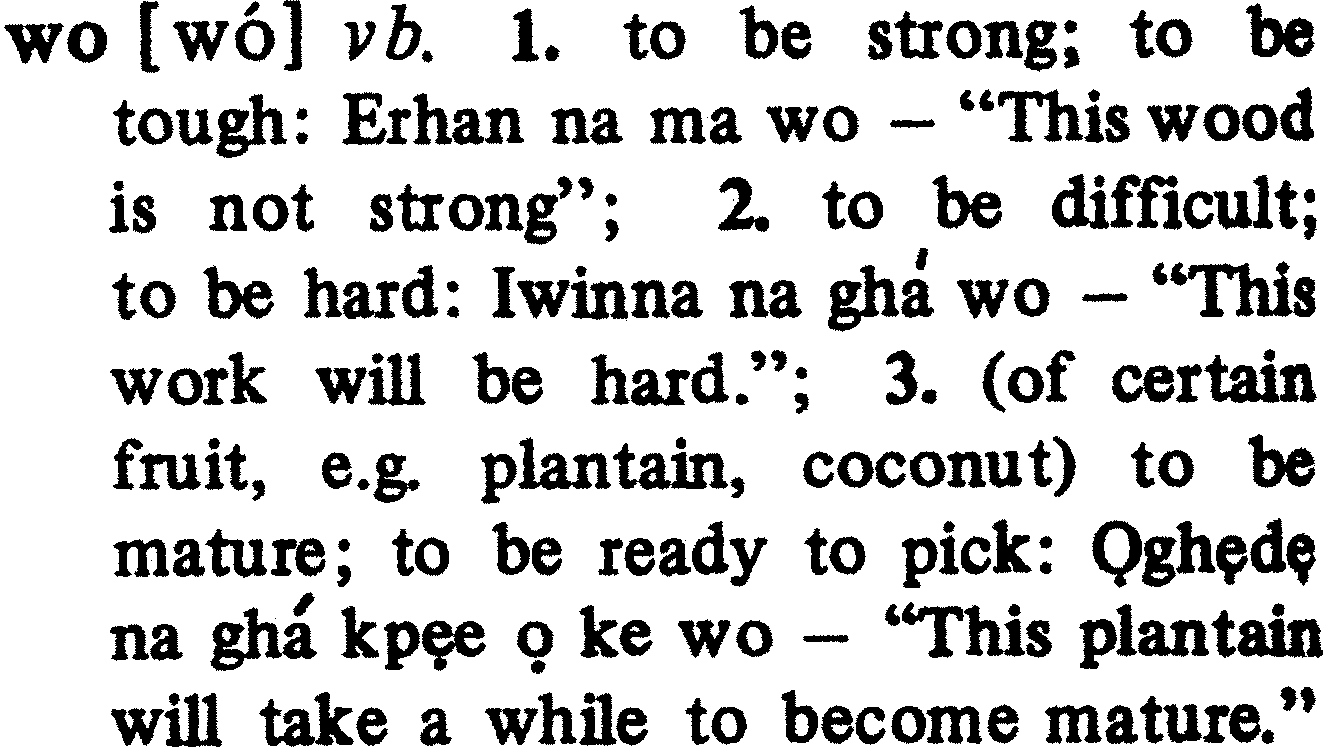
wogho [wòɣó] vb. (of a crowd) to
make noise ― “Iran gha wogho yọ
mwan ehọ”^ ― “They are making noise
in one’s ears.”

wooo [wòòò] adv. 1. describes a con-
tinuous dull but intense (e.g. from
pepper) pain ― Ọ balọ wooo ― “It
hurts persistently”; 2. describes
the glow of red-hot logs: Ọ baa wooo
― “It glows warmly.”
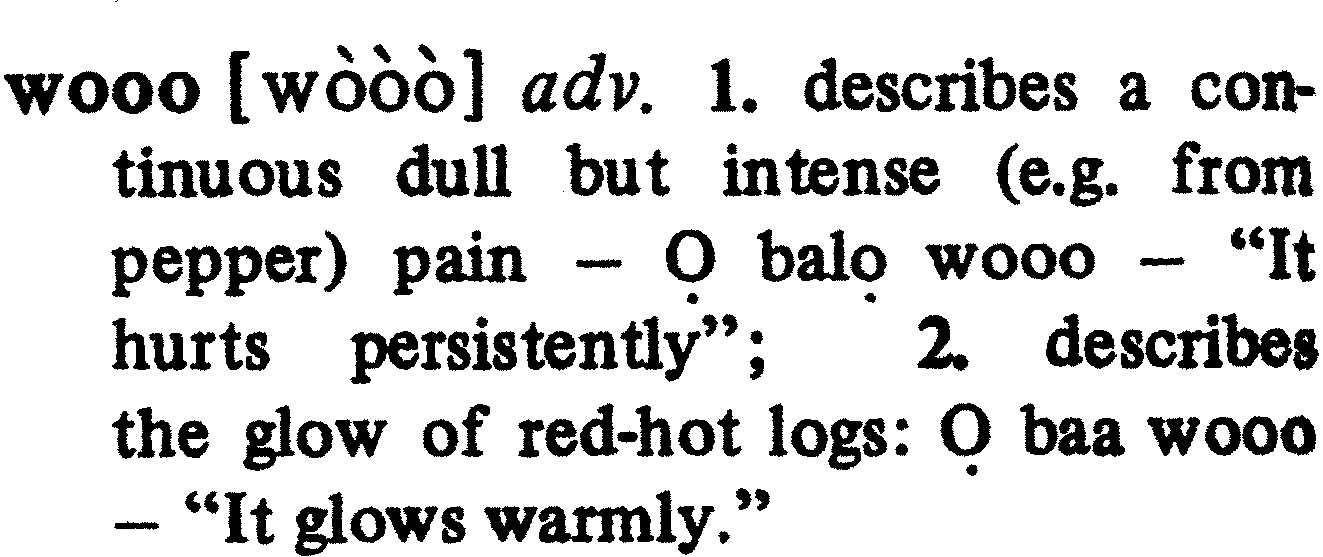
worua [wòɽùá] vb. to become cool; to
cool down. (cf. furre).

wowowo [wòwòwò] adv. describes 1.
brightly-burning fire; or 2. the taste
of a peppery-hot soup. (cf. wooo).

wọn [wɔ̃́] vb. to drink: Ọ wọn
ukhunmwun ― “He drank medicine.”
(cf. wanmẹ).

wọnwọnwọn [w̃ɔ̃̀w̃ɔ̃̀w̃ɔ̃̀] adv.; adj. de-
scribes a greasy look.

wọọ [wɔ̀ɔ́] vb. to tire, to be fatigued;
Egbe wọọ mwẹn ― “Body has fatigued
me: I am tired.”

wọọrọ [wɔ̀ɔ̀ɽɔ̀] adj.; vb. long; extend-
$Page 163$

ed; tall.

wu [wú] vb. 1. to die: Amwẹn ọnrẹn
wuru ― “His wife died.”; 2. to break
(e.g. of glass, china, mirror, bottle,
etc.) Ọgọ-amẹ wuru ― “The water-
bottle broke.”

wua [wùá] vb. to forbid; to be
%%

tabooed. Ma wua egilẹ ― “We forbid
(the eating of) snails.”

wulo [wùló] vb. pl. and iter. sense of
wu: Iran hia wulo ― “They all died.”

wuo [wùó] vb. to rub on: Ọ ya ori
wuo egbe ― “She rubbed her body
with cream.”
